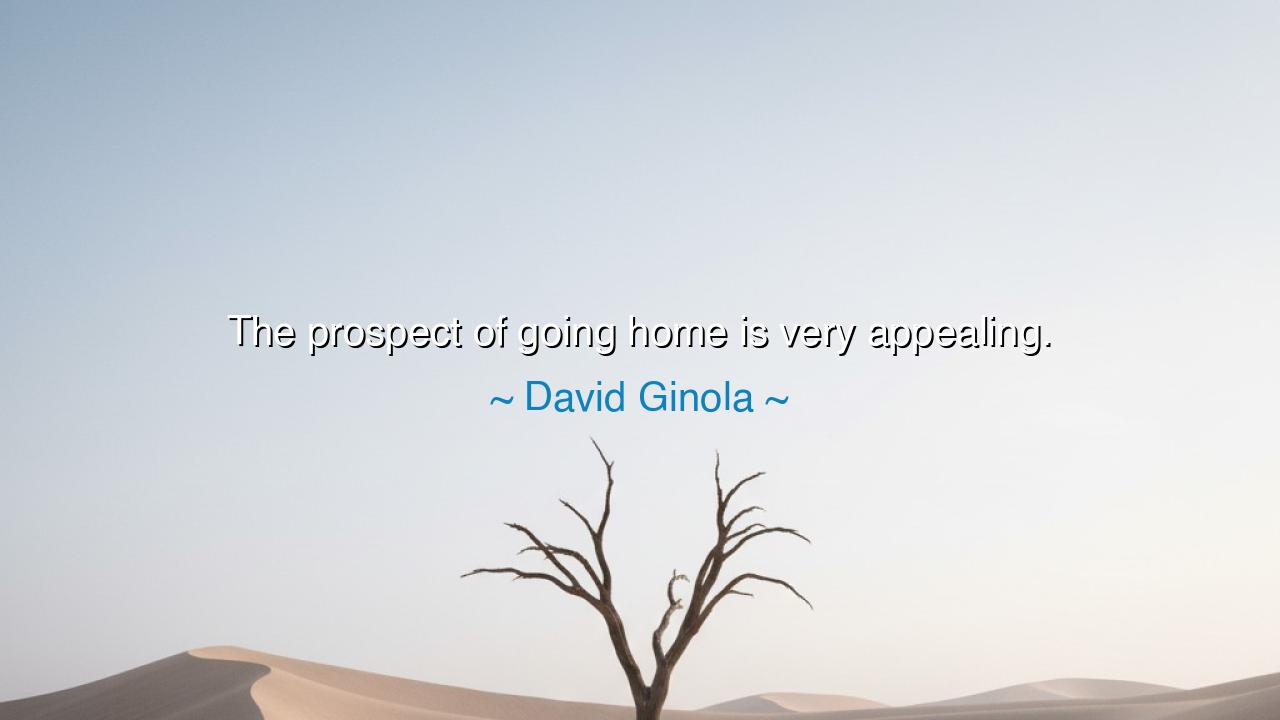
The prospect of going home is very appealing.






“The prospect of going home is very appealing.” Thus spoke David Ginola, the French footballer whose words, though simple, hold a weight of universal truth. Beneath their calm surface lies a timeless longing shared by all who wander far from the familiar hearth — the yearning for home. In these few words, he touches upon the ancient desire that has stirred in the hearts of travelers, soldiers, exiles, and dreamers throughout the ages: the call to return to the place where the soul first learned to rest. To go home is not merely to cross a distance; it is to return to wholeness, to that sanctuary of belonging from which life began.
For every journey, no matter how glorious or necessary, carries within it a shadow of solitude. The athlete who stands before cheering crowds, the soldier who marches under the banner of duty, the scholar who seeks truth in distant lands — all feel, in some quiet hour, the ache for the world they left behind. The prospect of going home, then, becomes more than a physical return; it is the restoration of the self after the storm of effort. It is the promise that beyond struggle and triumph alike, there waits a peace unearned by fame or fortune — the gentle peace of familiarity, of love that asks for nothing.
Ginola, a man who lived amid lights and stadiums, knew the loneliness that fame conceals. His reflection reminds us that even the strong and celebrated crave the simplicity of home, where one is known not for victory, but for being. In that longing, he joins a chorus of voices that spans centuries. For what Odysseus sought across the seas, what pilgrims sought across deserts, what soldiers whispered to the stars in foreign fields — all is contained in his quiet confession. The journey outwards is glorious, but the return is sacred.
Consider the tale of Odysseus, the great wanderer of Homer’s song. Ten years he fought at Troy, and ten more he struggled to return. Tempted by comfort, delayed by storms, held by gods and monsters, still his heart was fixed upon one thought — Ithaca. When at last he reached his home, weary and aged, he found no gold nor crown waiting, only the embrace of his wife and the warmth of his hearth. Yet in that embrace, he found what all the world’s adventures could not give — peace. So it is with all who labor far from their origins. The truest reward is not the applause of strangers, but the quiet welcome of home.
To say that the prospect of going home is appealing is, therefore, to speak to the deepest part of the human condition. We are wanderers by fate, but belonging by nature. The soul, like the body, must sometimes travel, must strive, must fall and rise again — yet always it yearns for the stillness of return. Even those without a physical home understand this yearning; for “home” is not always a house or a city — it can be the presence of a loved one, the sound of a language, the peace found in faith, or the rediscovery of oneself after being lost.
And yet, there is wisdom in the waiting — for only those who have journeyed far can truly understand the worth of home. Just as hunger deepens the joy of food, absence deepens the sweetness of return. When the heart grows weary of striving, it learns what truly matters: not the glory of the road, but the grace of the hearth. Home becomes not a place of escape, but of renewal — the sacred ground where one may rest, reflect, and begin again.
Lesson: Seek great adventures, pursue noble goals, and travel far in your life’s work — but never forget where you began, nor what your heart calls home. Let ambition carry you outward, but let gratitude guide you back. For every victory loses its meaning if there is no place of peace to return to, no soul who remembers your truest self. Home is the proof that love endures beyond achievement, that rest is as vital as striving, and that every journey, no matter how far it leads, finds its purpose only in the act of coming back.
So, remember the wisdom hidden in David Ginola’s quiet words. However wide the world, however long the road, the thought of returning — of walking once more upon the soil of home — will always draw the weary heart. And when that moment comes, do not rush past it; let it fill you. For to go home is not to end your journey, but to remember why you began it.






AAdministratorAdministrator
Welcome, honored guests. Please leave a comment, we will respond soon